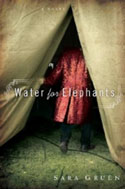- Categories:
Everything's Coming Up 'Rosie' for New Algonquin Title
 Sara Gruen, author of Water for Elephants, the number-one selection on the June Book Sense Picks list, was just a day away from starting a different novel, when an article about a photographer named Edward J. Kelty caught her eye -- and then her undivided attention. As she read the story, Gruen was moved by a sudden, intense interest in Depression-era traveling circuses that "came completely out of the blue." The result is Water for Elephants, a novel from Algonquin Books that has garnered an extraordinary show of independent bookseller support and very positive buzz prior to its late-May publication date.
Sara Gruen, author of Water for Elephants, the number-one selection on the June Book Sense Picks list, was just a day away from starting a different novel, when an article about a photographer named Edward J. Kelty caught her eye -- and then her undivided attention. As she read the story, Gruen was moved by a sudden, intense interest in Depression-era traveling circuses that "came completely out of the blue." The result is Water for Elephants, a novel from Algonquin Books that has garnered an extraordinary show of independent bookseller support and very positive buzz prior to its late-May publication date.
The story about Kelty, who in the 1920s and '30s followed and photographed traveling circuses, "was so incredibly fascinating," Gruen related, "that I dropped everything and ordered two of his books of vintage circus photos, and completely abandoned the other book. The photos were so evocative and incredible; I called the Circus Museum [in Sarasota, Florida] -- the winter headquarters of Ringling -- and asked for books about Depression-era circuses. Most were out of print, so I got them over the Internet and through [antiquarian] booksellers."
|
|
Gruen's newfound, consuming interest in circuses led her on research trips to several states, where she visited a museum, a zoo, and an elephant sanctuary. She read countless articles and books about circus performers, and met several elephants, too, in preparation for writing about the mischievous and wise Rosie the elephant, and her human and animal colleagues at the Benzini Brothers Most Spectacular Show on Earth.
Water for Elephants is told from the point of view of Jacob Jankowski, a nonagenarian who lives in a nursing home. His musings introduce the reader to the 23-year-old Jacob, who is experiencing a traumatic time in his life: He must cope with the loss of loved ones, is forced to forsake his Cornell veterinary school education, and is unsure where he will live -- or how he will make a living.
An impulsive middle-of-the-night leap onto a moving train lands Jacob in a strange new life. He uses his skills to get a job with the circus and finds himself plunged into a complicated class system with often-incomprehensible rules. He also falls in love with the gorgeous Marlena (who happens to be married to the mercurial, violent circus boss) and gets a speedy, sometimes seedy, sex education to boot.
Water for Elephants is a well-drawn, fast-paced story, rife with circus lingo and lore. Gruen lyrically and colorfully describes the train's movements, the tensions between performers and workers, the animals' behavior, and Jacob and Marlena's dangerous romance.
The author's research allowed her to establish as a backdrop a stark, authentic portrait of circus life during the Depression. "If you had a job, you hung on to it," she explained, "even if you weren't paid -- as long as you were fed."
Water for Elephants also provides myriad details about daily living on a train. "It's the part I worked hardest on," Gruen said. "How did they step between cars without falling off? Did they have showers in 1931? It's such a strange idea, that you could take 1,500 people on a train, and move what's essentially a small city every night, and do this day after day."
Gruen knows she's not alone in her fascination with this piece of American history: "There's a huge community of circus fans, so I knew if I had anything wrong, they'd be all over it. It was a whole language I had to learn ... and I realized I had to get everything right."
As in her two previous, horse-centric novels (Riding Lessons and Flying Changes, HarperTorch), the author vividly portrays the close, intuitive relationships that can exist between humans and animals. And, like those books, Water for Elephants will impart an intimate knowledge -- in this case, of traveling circuses during the Great Depression -- but that education will have been subtle, a complement to the rich character portraits and the dramatic arcs of the protagonists' lives.
While researching the book, Gruen said, "I went to the circus at every opportunity ... especially the kind that show up and say, 'Free tickets!' and sell $20 popcorn, the modern-day equivalent of the Benzini Brothers."
She saw the Ringling show twice -- but it was at the smaller shows that she was able to meet the elephants. "The first time it happened, I was there with a bucket of peanuts and the elephant! I was terrified! But the elephant was the biggest love-bug.... I went home covered in slobber and was quite happy. Her name was Nosie, and she's forever connected in my mind to Rosie."
Gruen's love for animals dates to her childhood; so, too, does her love of writing and reading. At age eight, she and her brother created a Bear World inhabited by members of their stuffed-animal collection. The children collaborated on stories about the world, and created a daily newspaper for the bear community. At 12, Gruen wrote a letter to Penny Patterson, Coco the Gorilla's person, which resulted in a long-term correspondence. And, she added, "I read just about everything."
The author explained that, in addition to being an omnivorous reader, she was "almost a violinist.... I was two years into a performance degree when I ran off with stage fright." But the discipline Gruen learned from her musical studies has proven helpful in her fiction-writing pursuits -- as has the thick skin she developed while working at her former career as a technical writer.
"Technical writing was really great training," she said. "The most important thing was getting a really strong structure, first. Even though I don't write books from an outline, I have a good sense of the story's arc and larger structure in mind. And I worked with editors for 10 years, so I was able to get all the stuff about taking edits personally out of the way then!"
And there's that discipline: in the five years since she was laid off from her last technical-writing job, Gruen has written three novels at her desk in a walk-in closet (really -- there's a photo on her website, www.saragruen.com) and has two others in mind.
Of course, Gruen didn't work on her book 24/7. "It was really intense, and really hard, because of the amount of research.... Sometimes I'd find things to do other than write -- I'd paint the family room, for example. Finally, I turned off the phone, put myself in the closet, and just wrote. At the end, I was so tired I had no sense if it was any good at all."
And, she added, "It was such a desperate and eventful fictional world.... I was spending seven hours a day there, and then emerging at the end of the day to feed my family and become a 21st-century person again. It was exhausting."
One slightly less taxing endeavor, however, was finding and invoking the voice of the elderly Jacob. "The scary thing is, he was fully there in my head. In writing about the 1931 setting, I questioned everything, but I looked on old Jacob as an oasis of relief. I was frightened by how easy it was to be a cantankerous old man."
It was not as easy, though, to stop writing about Rosie the elephant. "Rosie was probably the most real of the characters, to me. When I was done with the book, I had postpartum depression -- I missed having an elephant in my life." It's no wonder -- Gruen's Rosie is a clever animal, and many of Water for Elephant's surprising and amusing stories are based on true tales the author discovered during her research, from booze-loving elephants who would fake bellyaches to get whiskey (a commonly used cure) to teetotaling pachyderms who went to great lengths to steal lemonade.
Gruen will soon be able to escape her walk-in closet: she will emulate her traveling-circus characters, and leave behind her home, husband, three sons, and a variety of animals (horses, goats, cats, dogs) to embark on a three-month, 37-city author tour. --Linda M. Castellitto


